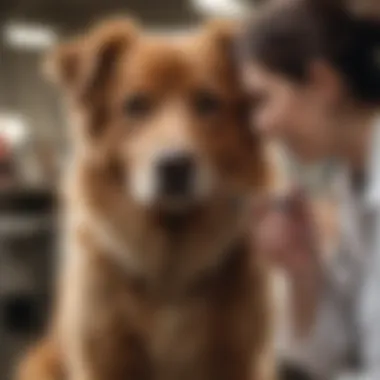Effective Strategies to Address Your Dog's Diarrhea


Intro
Diarrhea in dogs is a frequent issue that many pet owners face at some point. It can stem from various causes such as dietary changes, infections, or medical conditions. Understanding these factors is crucial for effective management. This section aims to highlight the significance of recognizing and addressing diarrhea in dogs, offering insights that empower owners to make informed decisions regarding their pet's health.
Understanding Your Pet
Breed Traits
Different dog breeds may exhibit varied sensitivities when it comes to their digestive systems. For instance, small breeds like Chihuahuas can be more prone to gastrointestinal upset than larger breeds, such as Labradors. Recognizing these traits can aid in tailoring dietary and care needs specific to your dog's breed. A well-balanced diet aligned with breed characteristics can fortify their digestive health.
Common Temperaments
The temperament of a dog can influence both its eating habits and response to changes in its diet or environment. Energetic breeds may require more varied diets to maintain their health, whereas calmer breeds might have steadier digestion. Understanding your dog’s temperament helps anticipate how it may react to stressors that could trigger diarrhea.
Special Needs
Some dogs have special dietary requirements due to allergies or health issues. Ingredients in their food can easily trigger digestive distress. Therefore, knowing your dog’s needs is critical in preventing diarrhea episodes. Regular consultations with a veterinarian about diet can aid in mitigating these risks.
Pet Care Essentials
Nutrition and Feeding Guidelines
Proper nutrition plays a key role in digestive health. It is essential to select high-quality dog food that meets the nutritional standards for your pet's life stage. Avoid abrupt changes in diet, which may upset their stomach. If a change is necessary, do it gradually over several days to minimize digestive issues.
Grooming Tips and Techniques
Maintaining a dog's hygiene supports overall health. Regular grooming helps to observe any physical changes that might indicate health issues, including skin irritations or unusual droppings. Stay vigilant about your dog's cleanliness after outdoor activities, as exposure to parasites can trigger diarrhea.
Health and Wellness
Routine veterinary check-ups are non-negotiable. Keep vaccinations current and monitor for any health issues that could affect digestion. Establish a health log to track any recurring issues, which can be useful for the vet.
Training and Behavior
Basic Training Techniques
Training your dog to follow basic commands can reduce stress in situations that may cause diarrhea. Anxious dogs often have more digestive issues. Reinforcement of good behavior and socialization can build your dog's confidence, thereby reducing the likelihood of stress-induced diarrhea.
Behavioral Problems and Solutions
Understand that behavioral issues such as anxiety may lead to gastrointestinal problems. Address these through consistent training and, if necessary, with the help of a professional trainer. Tailoring your responses to your dog’s specific reactions can significantly improve their overall behavior.
Mental Stimulation Activities
Providing mental challenges keeps dogs engaged and reduces anxiety. Puzzles and interactive games can be beneficial. A mentally stimulated dog is less likely to engage in stress-related behaviors, ultimately aiding in digestive health.
Engaging with Your Pet
Interactive Games and Toys
Incorporating games into your routine can strengthen your bond with your dog while providing necessary exercise. Choose toys that cater to your dog's size and temperament. Also, rotate toys to keep them engaging and stimulating.
Safe Outdoor Activities
Outdoor activities are vital for physical and mental health. However, ensure that your dog is protected from potential hazards that could lead to gastrointestinal issues, such as scavenging harmful substances. Supervised walks and activities provide both exercise and bonding opportunities.
Family-Friendly Pet Interactions
Encourage all family members to interact with the dog consistently. This participation fosters a stable environment, contributing to your dog’s emotional well-being. A relaxed dog is more likely to enjoy meals and have regular bowel movements.


Pet Adoption and Integration
Choosing the Right Pet for Your Lifestyle
If you are considering bringing a new dog into your life, assess your daily routine and living situation. Some breeds require more attention and care than others. Choose a pet that fits seamlessly into your lifestyle to mitigate stress for both you and the dog.
Preparing Your Home for a New Pet
When preparing your home for a new dog, ensure it is safe and welcoming. Remove any items that could pose a risk. Create a specific area for them that feels secure, helping to ease their transition into your home.
Tips for Smooth Prolusion
When integrating a new pet into your household, proceed gradually. Allow time for adjustments. Manage interactions with existing pets to avoid conflict. A smooth introduction can set the stage for a healthier environment that reduces stress and potential digestive issues.
Understanding the nuances of your dog’s behavior and health significantly enhances your ability to manage situations like diarrhea effectively. Being proactive is better than waiting for problems to escalate.
Understanding Diarrhea in Dogs
Understanding diarrhea in dogs is crucial for any pet owner. Diarrhea can be a symptom of many underlying health issues, ranging from dietary indiscretion to serious infections. By grasping the nuances of this condition, owners can take timely actions that can greatly affect their pet's well-being. This section aims to demystify diarrhea, explore common causes, and highlight important symptoms to monitor.
What Is Diarrhea?
Diarrhea refers to an increase in the frequency and fluidity of bowel movements. In dogs, this may manifest as loose, watery stools, and can accompany other signs of discomfort. Diarrhea can occur for a multitude of reasons, but recognizing its presence is the first step in effective management.
Key Characteristics of Diarrhea:
- Increased Frequency: More frequent trips outside or to the potty area.
- Consistency Change: Stools that are softer than normal.
- Possible Accompaniment of Other Symptoms: Such as vomiting or lethargy.
Common Causes of Diarrhea in Dogs
The causes of diarrhea in dogs are varied and can stem from simple dietary changes to more serious health concerns. Common potential triggers include:
- Dietary Indiscretion: Eating spoiled food, garbage, or human food that is not suitable for dogs.
- Food Sensitivities: Certain ingredients may not agree with your dog’s digestion.
- Infections: Bacterial, viral, or parasitic infections can lead to gastrointestinal upset.
- Underlying Health Issues: Conditions such as pancreatitis, inflammatory bowel disease, or kidney problems may also cause diarrhea.
Understanding these causes allows pet owners to make informed decisions about their pet's diet and healthcare.
Symptoms to Watch For
Identifying diarrhea is just the beginning. Pet owners should be vigilant for related symptoms that could indicate a more serious health issue. Key symptoms to monitor include:
- Dehydration: Signs include dry gums or excessive thirst.
- Blood in Stool: This could indicate a serious condition and warrants immediate attention.
- Vomiting: Frequent vomiting alongside diarrhea can lead to rapid dehydration.
- Lethargy or Weakness: Any marked change in energy levels can be concerning.
It is important to remember that while diarrhea can sometimes be mild and resolve on its own, persistent or severe cases require veterinary attention.
By keeping an eye on these symptoms, pet owners can assess the severity of their dog's condition and take the necessary steps towards treatment or preventive measures. A careful monitoring process can be a vital part of responsible pet ownership.
Immediate Actions to Take
When a dog experiences diarrhea, it can be a stressful time for both the pet and the owner. Understanding what immediate actions to take is crucial in managing the condition effectively. These early steps not only help in diagnosing the severity but also provide comfort and care to your pet. Taking action promptly can influence the outcome, ensuring your dog’s health does not further deteriorate.
Assessing the Severity
Assessing the severity of diarrhea is the first crucial step in determining the appropriate response. Owners should observe their dog's condition closely. Key factors to consider include:
- Frequency of diarrhea: How often is your dog experiencing loose stools?
- Appearance of stools: Are there any unusual colors, blood, or other abnormalities?
- Behavioral changes: Is your dog lethargic or unusually active?
- Duration: How long has the diarrhea persisted?
If diarrhea is mild, it may resolve on its own within a short time frame. However, if your dog shows signs of lethargy, vomiting, or if the issue lasts longer than a day, it may indicate a more severe problem requiring veterinary attention. Monitoring these variables is key to making informed decisions moving forward.
Monitoring Hydration Levels


Hydration is a critical concern during episodes of diarrhea. Dogs can quickly become dehydrated, especially if diarrhea is severe or prolonged. Signs of dehydration include:
- Dry gums
- Lethargy or weakness
- Loss of elasticity in the skin
To monitor hydration, a simple test involves pinching the skin at the back of the neck. If the skin does not return to its normal position quickly, this may indicate dehydration. Providing fresh water is essential, and in more severe cases, offering an electrolyte solution designed for pets can aid in replenishing lost fluids. Keep an eye on your pet's demeanor and water consumption, as both can signal changes in health status.
Dietary Adjustments
In response to diarrhea, making dietary adjustments can act as a remedy. It is generally advised to implement a bland diet temporarily. Options include:
- Boiled rice: Easy to digest and provides necessary carbohydrates.
- Boiled chicken: Skinless and boneless, it can help introduce protein without putting excessive strain on the stomach.
- Pumpkin: Canned pure pumpkin can help firm up stools due to its high fiber content.
It's essential to transition slowly to any new diet to avoid further stomach upset. Gradually reintroducing regular food after a 24 to 48-hour period can help stabilize your dog’s digestive system. If dietary changes do not lead to improvements, it is paramount to consult a veterinarian to rule out any underlying conditions.
Home Remedies for Diarrhea
Home remedies for diarrhea in dogs can be crucial for owners faced with this common issue. Minimizing the impact of diarrhea can be done effectively at home, provided the situation is not severe. These remedies often involve simple dietary adjustments and hydration strategies that can help restore your dog's digestive balance. It's essential to approach these solutions carefully, keeping in mind the unique needs of your pet.
Bland Diet Options
A bland diet can help soothe an irritated digestive system. Common options include boiled chicken breast, rice, or plain pumpkin. These foods are gentle and easily digestible, providing nutrients without overwhelming the stomach. Here's how to create a bland diet for your dog:
- Start with small portions, about a quarter of their usual meal size.
- Gradually increase the portion if no adverse reactions occur.
- Monitor your dog’s response and adjust as needed.
It's important to avoid adding spices or oils, as these can irritate the stomach further. Use these bland options for a few days until normal digestion resumes.
Probiotics and Their Benefits
Probiotics play a significant role in restoring gut flora. They are live microorganisms that promote healthy digestion. Supplementing your dog's diet with probiotics can facilitate recovery from diarrhea by helping to restore the natural balance of bacteria in the gut. Probiotics can be found in various forms:
- Powders that can be mixed in food.
- Chews that dogs may find appealing.
- Yogurt (plain, without artificial sweeteners) in small amounts can also serve as a natural source.
Consult your veterinarian about the best options for your dog’s specific needs. Probiotics might not resolve all digestive issues but can be beneficial in many cases.
Hydration Solutions
Maintaining hydration is vital when a dog suffers from diarrhea. Dehydration can quickly become a serious problem. In addition to providing fresh water, consider these hydration solutions:
- Electrolyte Solutions: Products specifically designed for pets can help restore balance. Look for non-sugar options without artificial ingredients.
- Homemade Solutions: You can create a simple electrolyte drink using water, a pinch of salt, and a small amount of sugar (1 teaspoon of sugar to 1 liter of water).
Tip: Always encourage your dog to drink small amounts frequently rather than consuming large quantities at once.
When to Use Over-the-Counter Solutions
Over-the-counter medications can sometimes assist in managing diarrhea but should be used with caution. It’s crucial to consult your veterinarian before starting any medication to ensure it's safe for your dog and properly addresses their specific needs. Some common over-the-counter options include:
- Psyllium Husk: It can help bulk up stool.
- Loperamide: Often used to slow down digestive transit. However, this is not safe for all dogs, especially those with certain health conditions.
Besides, these solutions should not replace the need to monitor your dog closely. Should the symptoms persist or worsen, seek veterinary care immediately. Always rely on your veterinarian's guidance over self-prescribing pills.
When to Seek Veterinary Care
When dealing with your dog’s diarrhea, it is crucial to know when professional veterinary care becomes necessary. Diarrhea can sometimes appear mild, but it can also indicate more serious health problems. Understanding the significance of timing in seeking care can potentially save your dog's life or alleviate unnecessary suffering.
It's important for pet owners to be vigilant and assess their dog’s overall condition. Prompt veterinary assistance can prevent complications, ensuring that any underlying issues are addressed early. This not only facilitates a faster recovery for your dog but also provides peace of mind for you as an owner.
Identifying Severe Symptoms
Knowing the signs that indicate a need for immediate veterinary intervention is paramount. Severe symptoms may include:


- Vomiting that occurs alongside diarrhea
- Blood in the stools
- Persistent diarrhea lasting more than 24 hours
- Signs of dehydration—this can manifest as excessive thirst or lack of energy
- Abdominal pain or bloating
- Fever or lethargy
Recognizing these symptoms can help in making an informed decision. If you observe any of these criteria, do not hesistate. Take your dog to the veterinarian as soon as possible.
The Veterinary Consultation Process
During a consultation, the veterinarian will typically conduct a comprehensive examination of your dog. They will inquire about the symptoms, its duration, and any other relevant information. You may be asked to provide a detailed history of your dog’s diet and any recent changes in routine or environment.
The consultation aims to:
- Determine whether the diarrhea is acute or chronic
- Assess overall health to rule out major illnesses
- Discuss potential interventions tailored to your dog’s needs
Your openness and accuracy in providing information will aid in a swift diagnosis and effective treatment plan.
Common Diagnostic Procedures
The veterinarian may utilize several diagnostic procedures to ascertain the cause of the diarrhea. These procedures often include:
- Physical examination to gauge overall health and look for signs of dehydration or pain
- Fecal tests to check for parasites, bacteria, or other abnormalities
- Blood tests to assess internal organ function and overall health status
- X-rays or ultrasounds if intestinal obstruction or other serious conditions are suspected
These tests are essential for establishing a conclusive diagnosis. Timely veterinary intervention can mitigate serious complications and improve the chances of quick recovery for your dog.
Proper understanding and awareness can be lifesaving. Trust your instincts; if something seems off, it’s worth a visit to the vet.
Preventative Measures for Future Incidents
Preventing future incidents of diarrhea in dogs is crucial for maintaining their overall health and well-being. By taking proactive steps, pet owners can minimize the chances of their dogs experiencing gastrointestinal distress. Understanding the various measures that can be implemented is key to establishing a healthy routine for your pet.
Consistent Dietary Habits
Feeding your dog a consistent diet is essential for digestive health. Abrupt changes to feeding routines can disrupt the digestive system. Use the same brand and type of dog food regularly to establish a baseline. This not only helps their stomach adjust but also ensures they receive balanced nutrition. Always check the ingredient label for quality ingredients; avoidance of fillers and artificial additives can make a significant difference.
Gradual Dietary Changes
When introducing new foods, do so gradually. A sudden switch can lead to an upset stomach or diarrhea. Instead, mix small amounts of the new food with the old one over a period of about a week. Start with a 25% ratio of new food, increasing incrementally until the change is complete. This method allows the digestive system to adapt without undue stress, promoting a healthier transition.
Regular Vet Check-Ups
Routine veterinary check-ups are essential for early detection of potential issues. Regular examinations allow a veterinarian to monitor your dog's overall health, including digestive health. Vaccinations and preventative care should not be overlooked. This ensures that your dog is protected against common illnesses that may contribute to digestive problems.
Regularly updating your veterinarian about changes in behavior, appetite, or stool consistency can aid in targeted advice.
Understanding Your Dog’s Unique Needs
Each dog is unique, with individual dietary needs based on breed, age, and health status. Understanding these differences is essential for reducing the risk of diarrhea. Consult your veterinarian to create a tailored dietary plan that meets your dog's specific needs. If your dog has a history of digestive problems, consider incorporating specialized diets designed for sensitive stomachs.
A well-informed owner is the best advocate for their dog's health, especially regarding dietary considerations.
Keeping a close eye on your dog's reactions to various foods and managing their daily activities can further help in averting future incidents of diarrhea. By implementing these preventative measures, pet owners can significantly enhance their dog's quality of life.
Diarrhea in dogs is a significant issue that requires attention from pet owners. Understanding how to manage this condition can greatly enhance the well-being of your canine companion. This section reiterates the main elements discussed and emphasizes the benefits of being proactive in addressing diarrhea.
Summary of Key Points
In the earlier sections, we covered several important aspects:
- Understanding Diarrhea: A clear definition and common causes help owners identify the issue quickly.
- Immediate Actions: Knowing how to assess severity is crucial. Monitoring hydration levels can prevent serious health issues. Simple dietary adjustments may also support quick recovery.
- Home Remedies: Utilizing bland diets, probiotics, and hydration solutions can aid in managing diarrhea at home. Certain over-the-counter solutions can also be helpful.
- When to Seek Veterinary Care: Recognizing severe symptoms and understanding the veterinary process ensure your dog receives the necessary support.
- Preventative Measures: Consistent dietary habits and regular vet check-ups help prevent future incidents. Tailoring approaches based on an individual dog's unique needs offers the most effective care.
Final Thoughts on Diarrhea Management
Effective management of diarrhea involves understanding your dog's specific situation. Always be observant and keep track of any changes in behavior, diet, or stool consistency. This attention provides valuable insights that can guide decisions on treatment or when to contact a veterinarian.
Diarrhea can be a symptom of more serious health concerns. Therefore, being informed and prepared is vital. By employing the strategies discussed in this article, you can enhance your dog's health and overall quality of life. Regular vet visits play a crucial role in maintaining your dog's health and preventing issues like diarrhea.
Taking the time to educate yourself on your dog's needs will lead to better care and fewer health problems in the long run.



